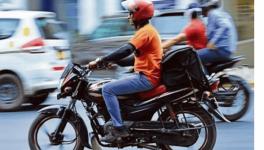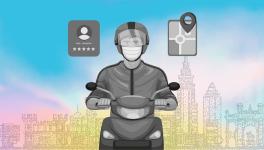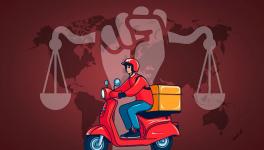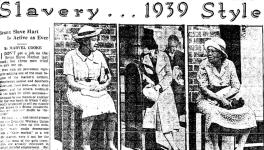If we Don’t, Nobody Else Will’: How Delivery Workers Organising Themselves in NYC
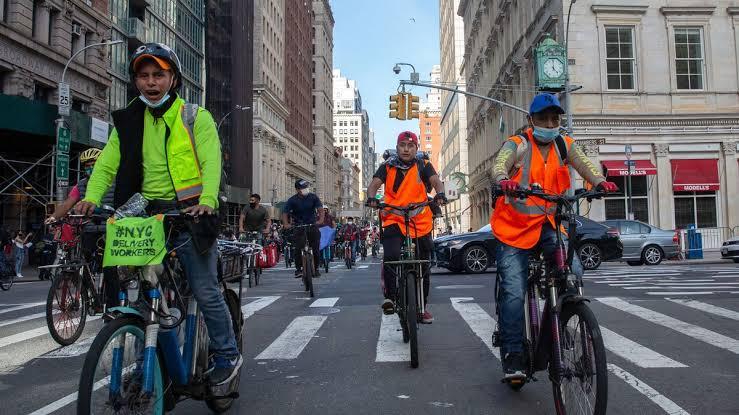
Delivery workers in the United State’s New York City are organising themselves in various ways to resist poor working conditions, low pay, lack of benefits and a series of violent thefts.
Around 80,000 delivery bikers work in NYC for apps like UberEats, GrubHub, and DoorDash, which have largely replaced direct deliveries by restaurants, according to People’s Dispatch. They played a major role in keeping the population fed during the Covid-19 pandemic as well. But the pandemic has only worsened their working conditions.
There is rampant theft and violence faced by delivery workers on the job, said César Solano Catalán, a 19-year old bike delivery worker, to People’s Dispatch.
Electronic bikes, which cost around USD 3,000, are mostly used for long distances and to beat the city traffic. However, these bikes have led to delivery workers being targetted by robbers, the digital publication reported. The bikes, just like the bags and helmets used by the workers, are not covered by their employers.
According to a survey of delivery workers carried out by the Workers’ Justice Project and Cornell University’s School of Industrial and Labor Relations, 54% of participants said they have had a bike stolen while around 30% said that they were physically assaulted during the theft.
As per media reports, lodging a complaint with the police about bike thefts mostly do not lead to recovery, in the experience of the workers. Moreover, losing a bike means wiping off several weeks’ worth of wages for a delivery worker as well as the mode of transport they require to earn those very wages.
Faced by such extreme conditions, César and some of his family members who work as bike couriers, began a Facebook page called El Diario de los Deliveryboys en la Gran Manzana or “The Delivery Boys in the Big Apple Daily.” The page acts as a channel for the city’s delivery workers to report bike thefts, assaults and deaths in their community, according to the report.
The workers have also created small groups on WhatsApp and Telegram to share info and stay in touch with each other while on the job. Delivery Worker Alerts, Emergency Group, and Robbery Alerts in the Big Apple are large, formalised groups where the members send updates on bike thefts and assaults, People’s Dispatch reported.
To check violent assaults at night, delivery workers are also forming night guard teams to maintain vigil in key places where assaults happen, such as the Willis Avenue Bridge that connects Manhattan to the Bronx, and the Queensboro Bridge that connects Manhattan to Queens.
“We decided that we had to do it ourselves, because if we don’t do it nobody else will,” César told People’s Dispatch.
On the other side, workers’ groups have been partnering with city officials and non-profits to propose legislations addressing their concerns. App-based delivery workers are classified as independent contractors. Hence, the companies that contract them like Uber and DoorDash are not bound to pay them a liveable wage and benefits such as health insurance and paid sick leave. The NYC delivery workers earn an average of $7.87 an hour, which is about half of the state’s minimum wage, according to the report by People’s Dispatch.
Moreover, according to the survey conducted by the Workers’ Justice Project and Cornell, a majority of the participants worked at least five days a week and over half of them worked six or seven days. The precarious job does not even provide essential services to the workers, such as permission to use the toilet at the restaurants. The survey found that 83% of delivery workers had been denied access to the restroom at eateries where they had gone to pick up orders.
To change this situation, the Los Deliveristas Unidos at Workers Justice Project partnered with several City Council members to introduce six bills to regulate delivery apps and improve the working conditions of delivery workers. Workers Justice Project is a Brooklyn-based workers resource centre, which serves immigrant, homecare and construction workers.
In September, the New York City became the first to pass comprehensive legislation to regulate the delivery industry. The bills passed by lawmakers seek to protect the workers’ interest and set minimum payment for food delivery workers at companies like Grubhub, DoorDash and Uber Eats.
Among some of the notable provisions of the bills are that the workers can set a maximum distance per trip; the food delivery apps have to pay delivery workers at least once a week; the drivers can refuse to accept trips over bridges or in tunnels; delivery services cannot charge workers for insulated bags to deliver food; food delivery services need to add a provision in their contracts with restaurants to let delivery workers use the toilets while picking up a delivery, etc. One bill also ordered the Department of Consumer and Worker Protection to conduct a study on food delivery workers and form rules on the minimum payment required per trip, the CNBC reported.
Get the latest reports & analysis with people's perspective on Protests, movements & deep analytical videos, discussions of the current affairs in your Telegram app. Subscribe to NewsClick's Telegram channel & get Real-Time updates on stories, as they get published on our website.











